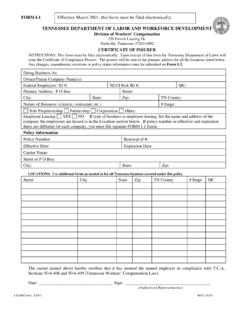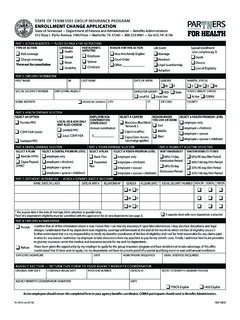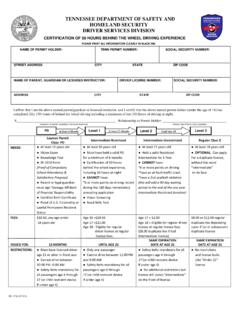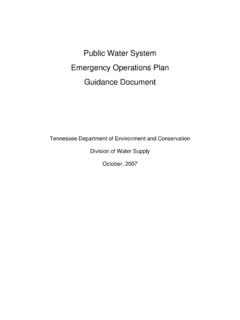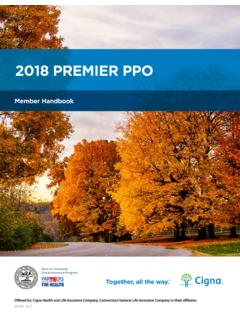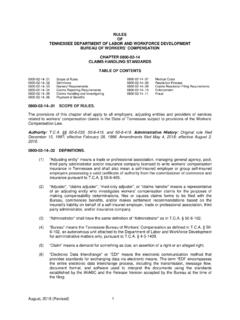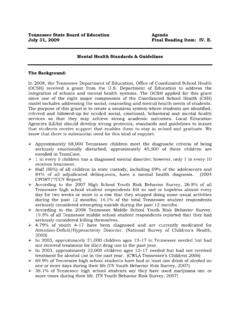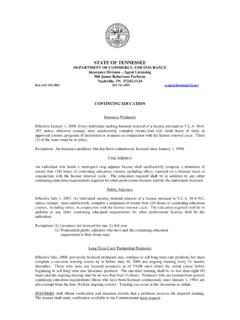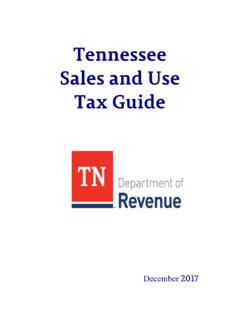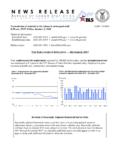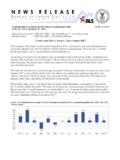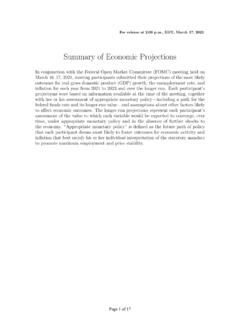Transcription of Chapter 5 - Filing Requirements - March 2021 - Tennessee
1 Contents Chapter 5: Filing Requirements ..80. Registration ..80. Electronic Filing ..80. Filing 1. Annual 2. Short-Period 3. Foreign Entities Newly Subject to Franchise and Excise Filing Due 1. Calendar Year, Fiscal Year, and Short-Period Filers ..83. 2. 52-53 Week Filers ..84. 3. Filing Extension ..84. 4. Estimated Assessment ..85. Change in Ownership - Filing Periods and Due Franchise Tax Proration and Annualizing Rents ..87. 1. Proration ..87. 2. Annualizing Rents ..87. Final Returns ..89. 1. True Final Return ..89. 2. Liquidation and Tax Base Calculation ..90. 3. Tax Clearance ..93. 4. Tax Collection ..95. 5. Events Not Resulting in a Final Return.
2 95. 6. Corporate Estimated Tax Payments .. 100. 1. Estimated Payment 100. 2. Quarterly Estimated Payment 100. 3. Remitting Payments .. 101. 4. Payment Due Dates .. 102. Penalties .. 102. 1. Penalties and Penalty Rates .. 102. 2. Penalty 105. 107. Delinquent 107. Statute of 108. 1. Assessments .. 108. 2. Refunds .. 108. 3. Statute Waivers .. 110. Records Maintenance .. 110. Assessment .. 110. Chapter 5: Filing Requirements All for-profit, foreign, and domestic entities formed or qualified with the Tennessee Secretary of State must file a franchise and excise tax return and pay at least the minimum Entities are subject to franchise and excise tax from their date of If an entity does not register with the Secretary of State.
3 The entity is liable for the tax from the date it begins operations with substantial nexus in the Failure to file a franchise and excise tax return or pay required fees and taxes may result in the revocation of a business's charter or Registration Persons subject to the franchise and excise tax should register with the Department within 15. days from the date they become subject to the There is no registration fee. Registration for sales tax, business tax, franchise and excise tax and more is accomplished on a single registration application. The Department requires a separate registration application for each business entity doing business in this state.
4 In the case of financial institutions forming a unitary business, the entity Filing the return on behalf of the unitary business should register with the Department, as should the other entities included in the unitary group. Electronic Filing Businesses must submit franchise and excise tax registrations, returns, and associated payments electronically6 through the Tennessee Taxpayer Access Point ( TNTAP ) or through an approved software vendor. The Department partners with the IRS in a program called IRS Modernized e-File ( MeF ). Through MeF, the IRS allows tax preparers to include the Tennessee tax return and any associated payment with its electronically filed federal return.
5 The IRS forwards the Tennessee tax return directly to the state. Please see the IRS MeF webpage for more information on how to enroll. It can be found at information Filing Period A franchise and excise tax return is required for every closing of the books and records of the taxpayer. The reporting period for the state return will match the reporting period the entity 80 | P a g e uses for federal income tax As such, the period dates at the top of the franchise and excise tax returns, Forms FAE 170 and FAE 174, should correspond with federal income tax return period dates. Taxable entities incorporated, domesticated, qualified, or otherwise registered to do business in Tennessee that are inactive in Tennessee for the entire taxable period must pay the minimum tax and may file only the first page of the franchise and excise tax return.
6 Such taxpayers may omit the remaining pages. Information concerning the Requirements and details of federal tax periods can be found in IRS. Publication 538 at 1. Annual Returns Calendar Year and Fiscal Year A calendar year return covers 12 consecutive months, beginning on January 1st and ending on December 31st. A fiscal year return also covers 12 consecutive months, but it begins on the first day of any month other than January and ends on the last day of the 12th month following ( , July 1st through June 30th of the next calendar year). 52-53 Week Fiscal Year The IRS allows businesses to file their federal income tax return using a 52-53 week fiscal tax year.
7 The Department accepts the federal 52-53 week return and considers it an annual return for the purpose of prorating the franchise The 52-53 week reporting period will not be considered a short-period return even if the period covers less than 365 days. A 52-53 week fiscal year is one that varies from 52 to 53 weeks during any particular year. The 52-53 week year allows businesses to end their tax year on the same day of the week every year. Any day of the week may be used. The 52-53 week tax year ends either on the date on which that same weekday last occurs in a calendar month or on the date on which that same day of the week falls that is nearest to the last day of the calendar month.
8 Some tax years will end in December and some will end in January. 81 | P a g e 2. Short-Period Returns Short-period returns are filed for tax Filing periods covering less than 12 months. Initial returns, final returns, and returns involving reorganizations are often short-period returns. Short-period returns are filed if the person filed a short-period return for federal income tax purposes. Because the Filing period of the franchise and excise tax return must coincide with the accounting period of the federal return, short-period franchise and excise tax returns must match federal short-period returns. However, a business included in two annual consolidated federal returns in a single year may file two franchise and excise tax returns.
9 See an example in the section Change in Ownership Filing Period and Due Dates.. Examples of Short-Period Returns The following are examples of when businesses file short-period returns. Business files an initial return in its first year of existence. Business is not in existence for the entire tax year due to a merger, termination, or liquidation. Business conversion results in a liquidation of the old entity, such as one converting from a corporation to an SMLLC. Business elects to change its reporting period for business reasons on federal Form 1128. The Department will accept two short-period returns if: A business is sold prior to the end of the year.
10 Its presale activity is included in the federal consolidated return of the presale parent;. and Its post-sale activity is included in the federal consolidated return of the new parent. Tax Year Adjustment 82 | P a g e To adjust its tax year, an entity must request federal approval by Filing federal Form 1128. The Filing period reported for the franchise and excise tax return must match the period reported for federal income tax purposes. Computational information related to short-period returns can be found later in this manual in the sections Annualizing Rent and Final Returns and Proration.. 3. Foreign Entities Newly Subject to Franchise and Excise Tax If an out-of-state foreign entity conducts any activity that gives it Tennessee nexus in a given year, it is taxable based on its federal tax year or reporting period.
